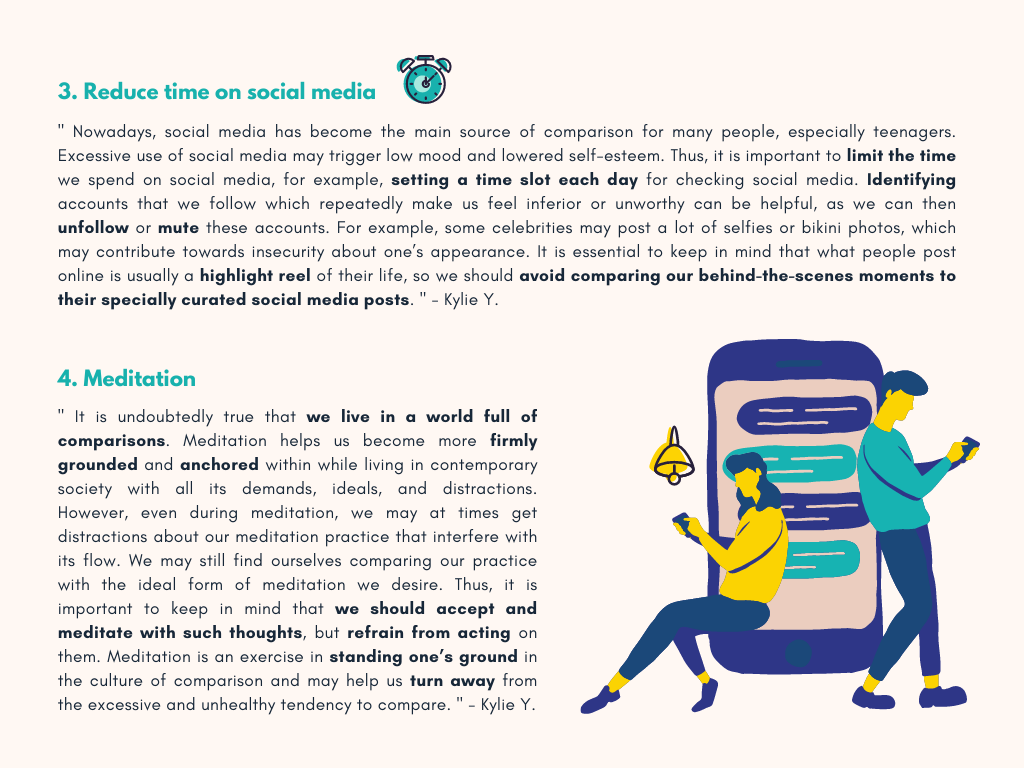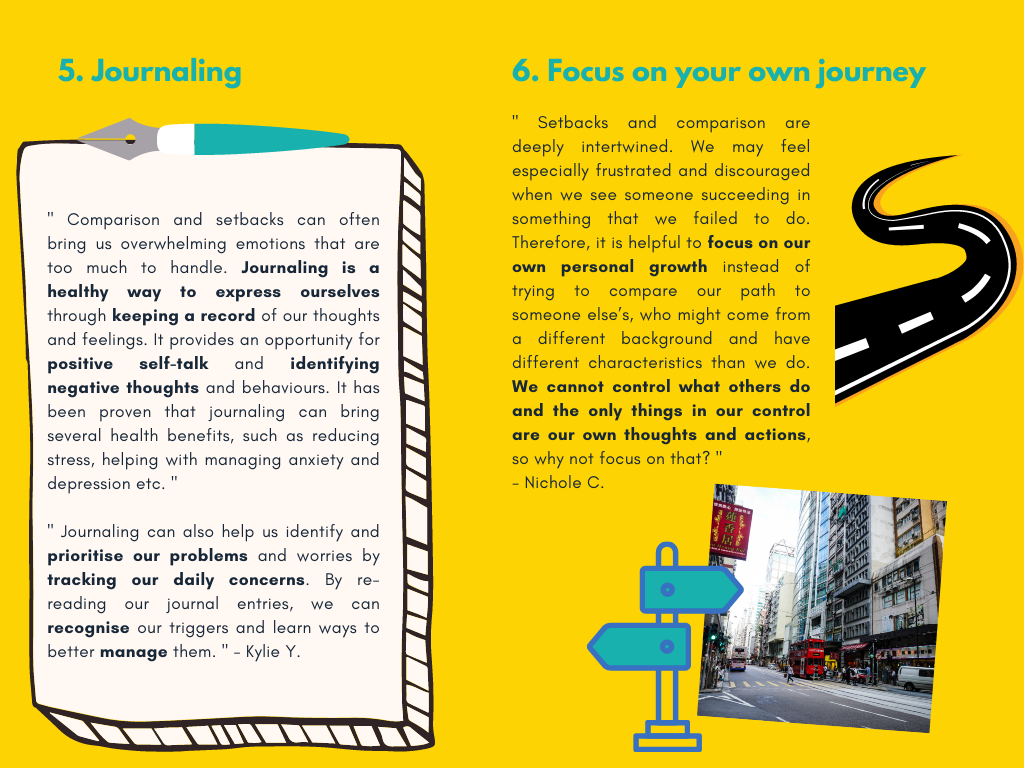About Comparison
Social comparison is a major issue among young people. Youth may suffer from serious psychological consequences due to social comparison, such as anxiety, low self-esteem and low satisfaction. Comparisons can take on various forms, like comparing body weight, achievements or material possessions. Smith-Jackson & Reel (2012) found that comparison between peers is a major factor contributing to weight concerns in university freshmen, particularly in females. Another study also showed that adolescents aged between 16 to 21 reported a moderate level of comparison between siblings (Jenson et al., 2015). Moreover, Chen (2008) showed that more than half of the Hong Kong adolescents, who participated in the study, engaged in social comparison with peers in terms of material goods. It is suggested that social media usage has a positive correlation with social comparison behaviour (Verduyn et al., 2020). In this digital age, almost every youth has a social media account and can easily compare their lives with someone else’s. Thus, we can see that comparison behaviour is very prevalent among our society and youth are especially susceptible to social comparison.
As social animals, human-beings seem to possess a natural tendency to compare with others. While different scholars have proposed various theories explaining this phenomenon, many agree that people compare with others for self-evaluation (Gibbons & Buunk, 1999). By examining the status of others (for example, how your peers did in a test, or how much time your classmates took to run 100m), we get a clearer picture of our performance relative to others. This helps us evaluate our standing on various qualities in society (Buunk & Gibbons, 2007). With the information gained from self-evaluation, we can then seek possible ways to improve ourselves (Festinger, 1954). Apart from that, we may also engage in social comparison in hopes of enhancing our own self-esteem (Gibbons & Buunk, 1999). For example, trying to compare your drawing in art class with someone who’s not as artistic may make you feel good about yourself. All these motives drive social comparison, which is why this phenomenon is so entrenched in every aspect of our lives.
In Hong Kong
Since most HK schools are very academically-oriented, many students have felt the pressure of comparison by comparing their grades with their classmates’ from a very young age. This is fueled by the praise that students who achieve outstanding grades receive from their teachers and parents as it encourages students to strive towards gaining validation from others.
Furthermore, since a lot of schools have encouraged all-rounded development of students in recent years, this has caused many HK students to compare themselves not only to their peers’ academic achievements, but also to their successes in music, sports, debating etc. Students are likely to use the number of achievements as a standard to evaluate how successful they are as a person, which can cause a lot of stress and negativity.
Youth Sharing
Kylie Y.:
“Growing up in a prestigious school and being surrounded by high achievers, I have often found myself struggling with excessive comparison, whether it’s the grades I have received on my report cards, the number of leadership posts I have taken up, or even the number of friends I have.”
“Although comparison has given me the motivation to strive towards higher goals at times, it has also brought me a lot of self-doubt and low-self esteem. On top of that, my parents have always compared me to my classmates and their friends’ daughters since I was a child, which has played a significant role in shaping my competitive mindset.”
Lesley Y.:
“Living in Hong Kong, where society tends to focus on one’s achievements and shame failures and shortcomings, it is easy to compare ourselves to each other, even when we are feeling at our worst. I have always struggled with the habit of comparison. ”
“When I encounter setbacks in life, people around me (or even myself, internally) would compare my own situation with someone else’s and say that there are people out there in a tougher situation, which makes my experience invalid. However, having such a mindset is actually very unfair and unkind to myself.”
Nichole C.:
“Hong Kong has always been a notoriously competitive city. Because of the ubiquitous competition in academic attainment and career prospects, I often feel like I’m constantly chasing after a bigger and better goal. As a result, I sometimes fall into the trap of having my self-worth tied to my achievements – when I fail to achieve my goals, I label myself a failure. While it is impossible to reach all our goals in life, this unhealthy mindset could be very harmful to our psychological health. It is like becoming a strict and unloving parent to myself, giving love only on the condition that I successfully achieve my goals.”
How does comparison affect us?
Although we are naturally inclined to make comparisons in our heads, studies have shown that this is not necessarily helpful.
First, social comparison can negatively affect how we think about ourselves. As we engage in upward social comparison (i.e comparing ourselves to someone whom we consider superior or better-off) while browsing social media, we often end up with lower self-esteem and are more likely to evaluate ourselves as worse off (Vogel et al., 2014).
The impact of social comparison also extends to the realm of body image because people tend to compare our own body shape to those of friends, celebrities or even strangers on the street, especially amongst adolescents (Jones, 2001). However, by doing so, we are more likely to experience body dissatisfaction as well as worsened mood (Cattarin et al., 2000; Morrison et al., 2014).
Although we may think that downward social comparison (i.e comparing ourselves to someone who we consider as inferior or worse off) would be an effective mood booster, studies have shown that such mood-enhancing effect is only exhibited among individuals with lower self-esteem (Aspinwall & Taylor, 1993), suggesting that it is not something healthy to do.
Youth Sharing: Tips to Cope with Comparison and Setbacks
1. Self-compassion
“When I experience setbacks, I usually practise self-compassion exercises. Practising self-compassion allows you to accept your shortcomings and helps you to develop a growth mindset. I find listening to self-compassion or self-affirmation meditations particularly useful when I encounter setbacks in my life. It helps me to understand that failures or setbacks are a part of progress and we cannot avoid it. Instead, we can take this opportunity to show ourselves some kindness and grow from it.” – Lesley Y.
2. Sharing with friends
“On the other hand, sharing my difficulties and setbacks with my friends also helps me to gain new perspectives on the issue. When I encounter obstacles in my life, it is easy for me to dwell on the issue and my emotions, resulting in a downward spiral without myself noticing. Thus, sharing my burdens and issues with my friends prevents myself from overthinking on the setbacks in my life. Also, listening to my friends’ advice or opinions allows me to see things from multiple perspectives and helps me understand that setbacks are natural.” – Lesley Y.
3. Reduce time spent on social media
“Nowadays, social media has become a main source of comparison for many people, especially teenagers. Excessive use of social media may trigger low mood and lowered self-esteem. Thus, it is important to limit the time we spend on social media, for example, setting a time slot each day for checking social media. Identifying accounts that we follow which repeatedly make us feel inferior or unworthy can be helpful, as we can then unfollow or mute these accounts. For example, some celebrities may post a lot of selfies or bikini photos, which may contribute towards insecurity about one’s appearance. It is essential to keep in mind that what people post online is usually a highlight reel of their life, so we should avoid comparing our behind-the-scenes moments to their specially curated social media posts.” – Kylie Y.
4. Meditation
“It is undoubtedly true that we live in a world full of comparisons. Meditation helps us become more firmly grounded and anchored within, while living in a contemporary society with all its demands, ideals and distractions. However, even during meditation, we may at times get distractions about our meditation practice that interfere with its flow. We may still find ourselves comparing our practice with the ideal form of meditation we desire. Thus, it is important to keep in mind that we should accept and meditate with such thoughts, but refrain from acting on them. Meditation is an exercise in standing one’s ground in the culture of comparison and may help us turn away from the excessive and unhealthy tendency to compare.” – Kylie Y.
5. Journaling
“Comparison and setbacks can often bring us overwhelming emotions that are too much to handle. Journaling is a healthy way to express ourselves through keeping a record of our thoughts and feelings. It provides an opportunity for positive self-talk and identifying negative thoughts and behaviours. It has been proven that journaling can bring several health benefits, such as reducing stress, helping with managing anxiety and depression etc. In addition, journaling can also help us identify and prioritise our problems and worries by tracking our daily concerns. By re-reading our journal entries, we can recognise our triggers and learn ways to better manage them.” – Kylie Y.
6. Focus on your own journey
“Setbacks and comparison are deeply intertwined. We may feel especially frustrated and discouraged when we see someone succeeding in something that we failed to do. Therefore, it is helpful to focus on our own personal growth instead of trying to compare our path to someone else’s, who might come from a different background and have different characteristics than we do. We cannot control what others do and the only things in our control are our own thoughts and actions, so why not focus on that?” – Nichole C.
7. Naming our inner critic
“Giving a name to thoughts or emotions can help us manage them better. When we find ourselves comparing with other people, we can give such judgments a name, for example, Critical Carol. This helps us recognise the comparative thoughts and behaviours more easily and allows us to change our relationships with them. With practise, we can then create space between inner judgements and ourselves. It is important to understand that the voices in our heads don’t represent who we are as a person, and we are merely an observer of our thoughts. Although negative and critical thoughts may sometimes emerge, it does not reflect reality.” – Lesley Y.
8. Document your achievements
“When comparing yourself to others, we focus on their strengths and ignore our own. That is why we should go ahead and make a list of our achievements. It doesn’t matter what they are, big or small, as long as they are something we are proud of for achieving. We can include everything that comes to our mind, then reflect on that list and post it somewhere we can see every day. This helps us acknowledge our hard work and talents instead of downplaying our own strengths and the effort we’ve put into reaching for our goals.” – Kylie Y.
References:
Chan, K. (2008). Social comparison of material possessions among adolescents. Qualitative market research: an international journal. Social comparison of material possessions among adolescents | Emerald Insight
Jensen, A. C., Pond, A. M., & Padilla-Walker, L. M. (2015). Why can’t I be more like my brother? The role and correlates of sibling social comparison orientation. Journal of youth and adolescence, 44(11), 2067-2078. Why Can’t I Be More Like My Brother? The Role and Correlates of Sibling Social Comparison Orientation | SpringerLink
Kircanski, K., Lieberman, M. D., & Craske, M. G. (2012). Feelings into words: Contributions of language to exposure therapy. Psychological science, 23(10), 1086-1091.
Smith-Jackson, T., & Reel, J. J. (2012). Freshmen women and the “Freshman 15”: perspectives on prevalence and causes of college weight gain. Journal of American College Health, 60(1), 14-20. Freshmen Women and the “Freshman 15”: Perspectives on Prevalence and Causes of College Weight Gain (tandfonline.com)
Verduyn, P., Gugushvili, N., Massar, K., Täht, K., & Kross, E. (2020). Social comparison on social networking sites. Current opinion in psychology. Social comparison on social networking sites – ScienceDirect
How To Stop Comparing Yourself On Social Media https://victoriakleinsman.com/mindset/how-to-stop-comparing-yourself-on-social-media/#:~:text=How%20to%20Reduce%20Social%20Media%20Comparisons%201%20Know,instead%20of%20noise%205%20Instead%2C%20Compare%20Yourself%20to%E2%80%A6Yourself
Meditation in a Culture of Comparison
https://www.themeditationblog.com/meditation-in-a-culture-of-comparison/#:~:text=Meditation%20is%20an%20exercise%20in%20standing%20one%E2%80%99s%20ground,from%20what%20the%20rest%20of%20our%20culture%20stimulates
Journaling for Mental Health
https://www.urmc.rochester.edu/encyclopedia/content.aspx?ContentID=4552&ContentTypeID=1
Festinger, L. (1954). A theory of social comparison processes. Human relations, 7(2), 117-140.














